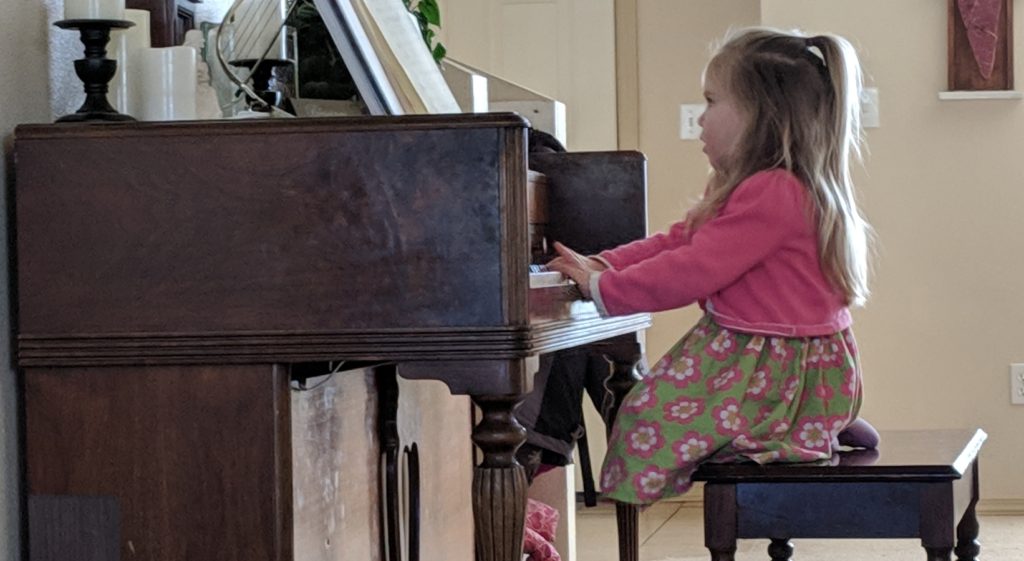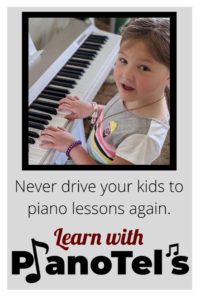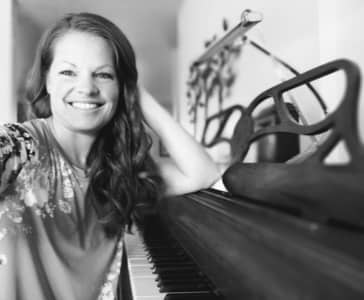
Maybe you have a three year old who seems musically inclined and you want to get her started on piano. Is it too early?
You can teach piano to 3 year olds! Piano lessons for 3 year olds are going to be different than piano lessons for older children, but it is not too young to start at age 3. Some studies have suggested that the optimal musical learning stage for children is between three and six years old.
So how do you go about teaching piano lessons to three year olds?
Piano Lessons for 3 Year Olds
The ideal way to teach piano lessons to a three year old is to make sure that the lesson material is age appropriate. The last thing you want to do is to frustrate either you or your 3 year old.
Piano lessons should be a time of fun and one-on-one time. The way you approach it will definitely be adopted by your 3 year old. And if you dread it, so will they!
Three year olds spend most, if not all their time in play. Play becomes a 3 year old’s work. Approach piano lessons in the same way that your 3 year old will — as a time for play! This, of course, is completely appropriate being as you are trying to teach the child how to play the piano.
A 3 year old’s attention span is going to be short. There is absolutely no need to make these lessons a lecture. Most of your lessons will be demonstrating and playing with the child. They will learn through discovery of music.
Learning through discovery
What kind of experiences can you give your child that will help them on their way to learning music? This is the optimal time to expose your child to a plethora of musical concepts. Discovery is the best way to teach a 3 year old. They are already hard wired to do this, so simply provide those experiences for them.
Discovering the Piano
One of the first things you want to do is to help them discover the piano. Open the lid to the piano (if you have an acoustic piano). Play the piano and watch the hammers and strings. Push the pedal and have them watch to see what happens.
Give him/her a toy car and have them drive the car “up” the piano and “down”. Sing while they play — if the piano pitch goes higher, sing higher. If the piano pitch goes lower, sing lower. Correlate the sound of your voice with the sound of the piano to show that piano notes go higher to the right, and lower to the left.
Play this game as often as you want — every lesson if need be!
Discovering Rhythm
A three year old is the perfect age to start teaching them rhythm and beat. Turn on some music and step to it. Take giant steps for slow beats, and quick steps for fast beats. Every time you get the chance, clap to the rhythm. Teach them to not only enjoy the music, but feel the rhythm.
As the student gains more rhythm through this discovery process, then begin to teach them notes values. Name the notes after food, or something they are familiar with.
Instead of worrying about teaching them the names of the notes (quarter, eighth, etc.) teach them the value by calling a quarter note a pear. Call an eighth note an apple. Teach them straw-berr-y and other more complicated rhythms.
Start simple, teach them things they can identify with. And build from there.
Musical Awareness
Another way to discover music, is to have them act out music. Take a song and identify the parts to a story, or objects within a story. Peter and the Wolf is a great example of this.
When they begin to make take abstract things (such as the music) and define it with concrete things, then they can begin to better understand the music.
Allow this to occur naturally through discovery as you play music and identify it with concrete objects and stories. They will begin to pick up on elements of the music as you do this.
Steps and Skips – Staff Awareness
A 3 year old can begin to hear the sound, and identify with steps and skips. Play games with him/her on the piano where they take an object and step up one note. Then they can skip notes.
Do the same thing with a blank staff. Step up and down the notes. Take the object for a ride and the student is the driver! Switch roles and have the student tell you to step or skip while you be the driver on the staff!
Continued Discovery through Repetition
As you and your three year old continue to discover music and the piano, allow a LOT of repetition. At this stage, repetition is key! Do the same things over and over again. You may get bored of it, but they won’t!
You will be pleasantly surprised to see how much they will start to get it and before long, they can be the ones teaching the lessons.
Even if you think they have a concept down, revisit it over and over again. Their memories are short-lived and you don’t want to assume they remember something you have taught them a long time ago only to discover that they have forgotten.
In this regard, teaching 3 year old piano lessons can be simple. Come up with a simple lesson plan that you can use almost every time. I would suggest something like this:
- Piano awareness — steps and skips on the piano, playing up and playing down
- Staff awareness — steps and skips on the staff, playing up and and playing down
- Note and note value awareness — identifying rhythms, learning new combinations of rhythms, dancing and clapping to the beat, etc.
- Music awareness — acting out stories, drawing pictures, describing the music and experiencing the music
Using Your Whole Body
At the age of 3, using your body is a very important aspect to learning. So as your student is learning piano, as much as you can use the body, do it.
When discovering a new sound, use your body to help reinforce it. For example, if the sound is going up, raise your hand up high in the air. As it is going down, raise you hand all the way down. Have the 3 year old copy these movements.
You see, the 3 year old can better learn as you engage more parts of the brain. When you use your body in correlation with the noise, it helps the brain to remember that. When you use multiple senses when learning, that also helps.
That’s why I like to use as many senses as possible — touch, taste, hear, smell, and sight. Use all of the senses through out the lessons and they can help you to teach and enforce these abstract concepts into something they can understand and remember.
Related Articles:
Choosing the Right Piano Teacher
Piano Lesson #1: Getting to Know Each Other and the Piano
Games and Activities for Teaching Piano
Tel loves her life as a piano player, a piano teacher, and a mom. Amid piano blogging, piano teaching, and piano playing, she loves a chance to fit in a good exercise class, volunteer at her kids’ school and at her church, and go on long dates with her husband. Full bio at About Tel.



This is beautiful and really helpful am on the move to teach music to 3 to 4 year old. Please I really need tips cause I want them to learn practicals.
I’m starting a 3yo and thankful for tips……… teaching.